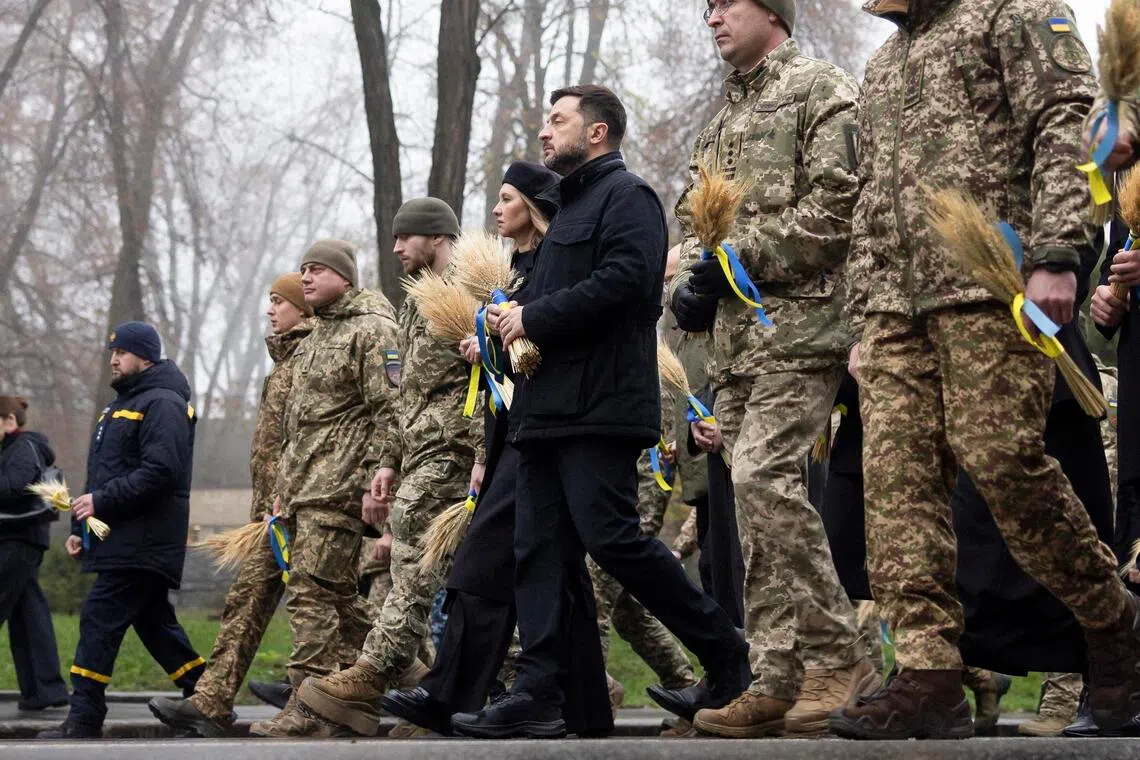Zelensky Ready to Advance US-Backed Ukraine Peace Plan, Seeks Talks with Trump & European Allies Amid Russian Strikes
 Ukraine
International Relations
Ukraine
International Relations

Ukrainian President Zelensky is ready to advance a US-backed peace plan and discuss it with Trump and allies. The plan, potentially requiring territorial conces
Zelensky Signals Readiness for US-Backed Ukraine Peace Plan, Seeks Talks with Trump & European Allies
Ukrainian President Volodymyr Zelensky has declared Ukraine's readiness to move forward with a US-backed framework aimed at resolving the conflict with Russia. He expressed a strong desire to engage US President Donald Trump in discussions regarding contentious points within the plan, emphasizing the crucial involvement of European allies.
Ukraine's Stance: Inclusivity in Peace Decisions
Addressing a "Coalition of the Willing" gathering, President Zelensky underscored Ukraine's unwavering belief that any security decisions impacting the nation or the broader European continent must include the respective parties. He cautioned against agreements made "behind the back of a country or its people," citing a high risk of failure. The framework, according to Zelensky, is "on the table," and Ukraine is prepared to collaborate with the USA and President Trump personally.
Trump's Hints and Diplomatic Momentum
Adding to the diplomatic buzz, President Trump recently hinted at a looming deal concerning Ukraine, though he refrained from divulging specific details, stating only: "We're going to get there." Meanwhile, Kyiv's national security chief, Rustem Umerov, suggested a potential visit by Zelensky to the US in the coming days to finalize an agreement, though Washington has yet to confirm such a trip.
This diplomatic flurry follows recent talks, including US-Ukrainian negotiations in Geneva and US Army Secretary Dan Driscoll's meetings with Russian officials in Abu Dhabi. White House Press Secretary Karoline Leavitt affirmed "tremendous progress" towards a peace deal, acknowledging "delicate, but not insurmountable, details" requiring further discussions among Ukraine, Russia, and the United States. The reports of a potential war-ending deal even influenced oil prices, which saw an earlier decline.
Contentious Plan Details Amidst Conflict
However, the path to peace remains fraught with challenges. The proposed 28-point plan, which reportedly surprised many in Washington, Kyiv, and Europe, includes provisions deeply concerning to Ukraine. These stipulations demand Kyiv cede territory beyond the approximately 20% already occupied by Russia since the February 2022 full-scale invasion, accept limitations on its military, and permanently forego NATO membership – conditions Ukraine has consistently rejected as tantamount to surrender.
The timing of this intense diplomatic push coincides with a period of vulnerability for Zelensky, marked by a recent corruption scandal leading to ministerial dismissals and ongoing Russian battlefield advances. Convincing the Ukrainian populace to accept a deal perceived as compromising national interests could prove a significant hurdle.
Ongoing Aggression and Russian Demands
Adding to the complexity, the backdrop of these discussions is a relentless campaign of Russian aggression. Its capital, Kyiv, recently endured a severe overnight barrage of missiles and hundreds of drones, resulting in seven fatalities and widespread disruption to power and heating systems. Such attacks fuel widespread skepticism regarding the feasibility of an imminent peace.
Russian Foreign Minister Sergei Lavrov, for his part, insisted that any revised peace plan must faithfully reflect the "spirit and letter" of understandings previously reached between President Putin and President Trump at their Alaska summit. He warned that deviating from these core agreements would fundamentally alter Russia's stance. The journey towards a lasting resolution, therefore, appears to be an intricate and arduous one, balancing urgent diplomatic efforts with the harsh realities of an ongoing conflict.